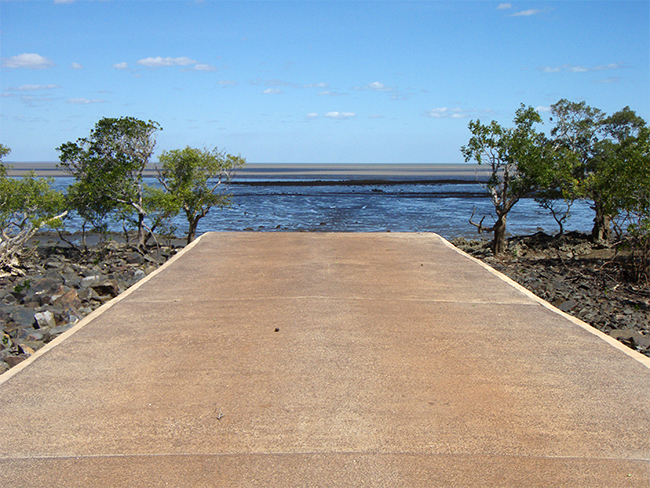Channel Point Coastal Reserve
Weed alert
Siam weed has been found in the Northern Territory and is a serious threat to Top End landscapes.
It can be easily attached to vehicles and clothing.
Stay on the track as you travel to and from Channel Point Coastal Reserve to help keep fishing and camping areas free of Siam weed.
Find out how to identify Siam weed.
Channel Point Coastal Reserve should be on every fishing enthusiast's top 10 list.
The reserve has some of the Northern Territory's most fertile fishing grounds.
It is located roughly 240km south of Darwin between the Daly River mouth and Channel Point, opposite the Peron Islands.
This area is recommended for self-sufficient anglers and boaters.
You should only consider the journey if you are experienced in Top End coastal conditions and have 4WD skills and equipment.
The campground is remote and access is restricted to 10 vehicles and no more than 50 people at any one time.
This park requires visitors to the NT to have a parks pass.
Get the Channel Point Coastal Reserve fact sheet and map PDF (872.8 KB).
Check if the park is open
For more information about park access, phone 08 8999 4555 during business hours.
| Park sites | Status | Comments | Forecast opening |
|---|---|---|---|
| Channel Point Coastal Reserve | Open | - | - |
During the dry season only.
Travel to Litchfield National Park and take the unsealed road to the reserve just north of Wangi Falls.
The reserve is about 240km from Darwin. There is 67km of unsealed 4WD road.
Check road conditions before you go.
You must have a campground booking for Channel Point Coastal Reserve.
Make sure you display your Channel Point Coastal Reserve booking confirmation on your dashboard.
If you arrive by boat, show your booking confirmation when you arrive at the beach.
Permits
You should also stay away from Aboriginal Land Trust areas on the Peron Islands and Bulgul Community and respect the private land that borders the reserve.
You need a fishing permit from the Northern Land Council to enter Aboriginal land, including waters overlying Aboriginal land.
For up-to-date information on permits visit the Northern Land Council website.
You can do all of the following activities in the reserve:
- fishing
- boating
- camping
- wildlife watching.
If you plan to launch a boat in the reserve you should be aware of the following:
- you can get access to the Peron Islands and the Daly River mouth from the reserve
- depending on the size of your boat, you may need a tide greater than 3.5 metres to safely launch and retrieve due to the rough nature of location in the Dry Season with strong south-easterly winds
- local tides are 20 to 30 minutes earlier than Darwin tides. Get tide information on the Bureau of Meteorology website.
Channel Point Coastal Reserve has all of the following facilities:
- information signs
- fire pits
- public toilets
- camping area
- showers
- boat ramp
- bore water
- emergency call device (ECD) located in the boatramp carpark.
When visiting the reserve, remember all of the following:
- visitors to the NT require a parks pass
- show your permit on the dashboard of your vehicle
- camp in marked camping areas
- collect fallen firewood only
- only light fires in communal fireplaces and keep fires small
- generators should be turned off between 10pm and 6am
- don't litter on land or sea, take your rubbish away to recycle
- don't bury fish waste, return it to deep waters or take it away
- cultural items, animals and plants are protected
- follow fishing laws
- nets, traps and firearms are not permitted, except for cast nets, crab pots and handspears
- pets are not permitted
- check that your vehicle is not transporting weeds and pests like cane toads
- motor bikes and quad bikes are not permitted
- keep to marked roads and tracks
- do not enter Channel Point Community residential area
- do not enter Aboriginal land.
You can have a safe and comfortable trip to Channel Point Coastal Reserve by doing all of the following:
- no swimming as this is a crocodile and box jellyfish habitat
- make sure your vehicle and boat are well-maintained and equipped
- carry and drink plenty of water
- carry plenty of food and fuel
- carry a first aid kit, including vinegar
- carry appropriate communication equipment
- wear suitable clothing and footwear, a shady hat, sunscreen and insect repellent
- avoid strenuous activity in the heat of the day
- observe all park signs.
Phone: 08 8999 4555
For emergencies the nearest health centre is at Batchelor 145km away. Phone: 08 8976 0011
Marine communication system: VHF CH16
Give feedback about this page.
Share this page:
URL copied!
